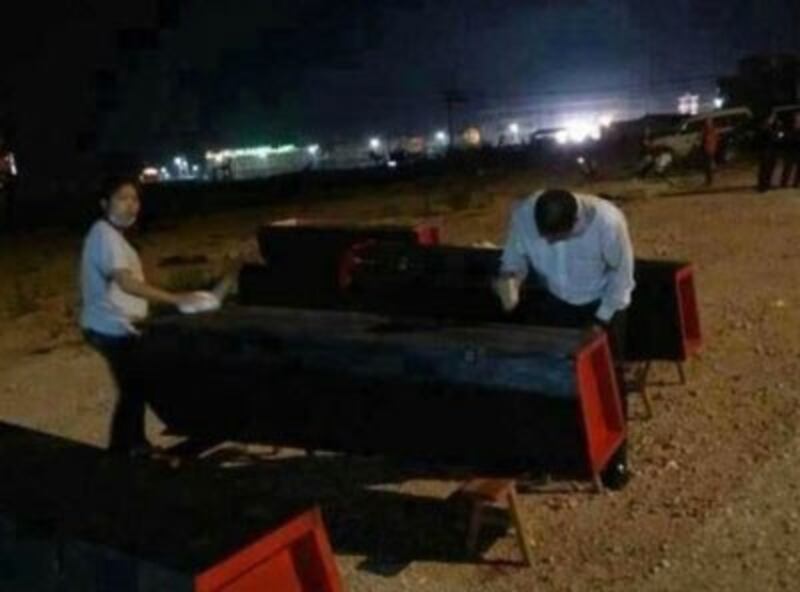A group of 20 nationals from China were turned away by hundreds of angry villagers in northeastern Myanmar’s Shan state Friday after crossing the border and attempting to plant a flag declaring the area to be Chinese territory, according to a local ethnic party official.
Shan Nationalities Democratic Party (SNDP) secretary Sai Tun Hle said the incident occurred when the Chinese nationals, including armed border guards, crossed into the area near Muse town from China’s Yunnan province and declared their intention to build a bridge across the Shweli (in Chinese, Ruili) river.
“They did not send any advance notice, they simply came over the border with several armed guards—around 20 in all,” he told RFA’s Myanmar Service.
“The villagers [from Muse] were concerned, so around 500 of them went to the area and rejected their demand.”
Sai Tun Hle said the matter had immediately been referred to authorities at the Shan state government level, who provided Muse authorities with a letter rejecting the claim.
When the Muse government administrator delivered the letter to the Chinese nationals, they left the area, he said.
Last year, villagers in the same area were angered when officials from both sides of the border jointly placed demarcation posts outlining the national boundaries, saying China had encroached on Myanmar territory.
Shan state officials later removed some of the posts, sources said.
Border bombing
The border dispute near Muse came as Myanmar acknowledged responsibility for a bomb mistakenly dropped in Yunnan province by its Air Force on March 13, killing five Chinese nationals, amid the ongoing conflict between government troops and ethnic rebels in Shan’s Kokang region.
Myanmar had initially blamed the bomb on the rebel Myanmar National Democratic Alliance Army (MNDAA), which denied responsibility.
China responded to the bombing by mobilizing jet fighters along the border, raising tensions.
On April 2, Myanmar's Union Minister for Foreign Affairs Wunna Maung Lwin led a delegation to Beijing and met with Chinese Vice President Li Yuan Chao at the Great Hall of the People, where he apologized for the blunder, the official Global New Light of Myanmar reported Friday.
“Wunna Maung Lwin expressed the apology of the Government and Armed Forces of Myanmar for the March 13 unfortunate incident in which 5 Chinese nationals were killed and 8 injured because of the stray bomb from a Myanmar Air Force aircraft that hit a sugarcane field” in Dashuisangshu village, the report said.
The delegation agreed to hold further discussions on “compensation for those who lost lives and [were] injured” and punish those responsible, it said, adding that the two sides would adopt measures to ensure that similar incidents would be avoided.
Zaw Htay, a spokesperson for Myanmar President Thein Sein’s office, on Friday confirmed that “Chinese people were killed because of the Myanmar Air Force bombing,” based on evidence presented by technical experts, and expressed sorrow for the incident.
“We have to solve this problem, as we have responsibility to do so,” he told RFA.
Criticism over compensation

Reports of the official apology drew criticism Friday from those in Myanmar who accused their government of bending to Beijing’s influence and questioned why it would compensate Chinese victims when similar offers had not been made for Myanmar civilians mistakenly killed in the conflict.
Nyo Nyo Thin, a lawmaker in Yangon division, accused the Myanmar government of cowering to China’s leadership.
“This kind of accident happens between border countries—the Chinese government has also made some mistakes against the Myanmar government,” he told RFA.
“In my personal opinion, the Myanmar government shouldn’t be so subservient to the Chinese government.”
Lawyer Ko Nyi said it was right for Myanmar to take responsibility for dropping the bomb in Chinese territory, but questioned why the government had been using such powerful weaponry against the ethnic Kokang Myanmar National Democratic Alliance Army (MNDAA) within its own borders.
“The Myanmar government takes care of people from other nations, but not its own citizens, even though they are suffering and dying [in the conflict],” he said.
“This is an entirely wrong attitude—a government’s foremost responsibility is to take care of its own citizens.”
Ongoing conflict
The MNDAA, under ethnic Chinese commander Peng Jiasheng, on Feb. 9 launched a bid to retake the Kokang region, which it had controlled until 2009.
Tens of thousands of civilians have been displaced or made homeless by the fighting in Kokang, with many of the ethnic Chinese minority fleeing across the border, when permitted to do so by Chinese border guards.
The Myanmar Times on Friday cited a spokesperson for the MNDAA as saying that fighting continued in the Kokang's Khote Htan area all day on April 1, though he gave no details of casualties.
Sporadic fighting also occurred during peace talks in Yangon between the government and representatives of 16 armed ethnic groups that culminated in the signing of a draft nationwide cease-fire agreement on March 31.
The MNDAA was not represented at the talks.
Reported by Pyone Moh Moh Zin and Thin Thiri for RFA’s Myanmar Service. Translated by Khet Mar. Written in English by Joshua Lipes.
